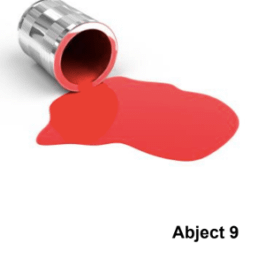Hysterically Real's De-automata, or Picture Books
Joe Hall
There’s an essay kicking around about the white supremacist settler necrostate instrumentalizing the pandemic that I have failed to write well, but, also, hammering this out on May 16th, day 58 of my lockdown, I find myself flat with sadness.
I go to the site Hysterically Real, open ooo by Jon Rutzmoser and undoom scroll through 124 pages, each with three images of the same cracked 45 of MC Hammer’s “U Can’t Touch This.” “U Can’t Touch This” is in the same position on each slide. I scroll through at least one slide where the records are rotated. Am I tempted to close read this repetition with slight variation? Cracked record=skip, crack, or glitch; the trembling intimacy of needle and groove v. the flatness of the screen and the academic shorthand of O[bject] O[riented] O[ntology]? No! And Yes. You cannot touch this. I laugh.
A PDF over is Jake Reber’s Abject-Oriented Anthology, which repositions and repeats outdated-stock-photo level images of abject-ish objects in a curious rhythm across its 100+ pages. The one that gets me is a sort of fuzzy orange thing with a belly button.
So, these are, among other things, punning picture books for adults burnt out on theory. Are Hysterically Real’s punning picture books making fun of high theory or its own capacity to engage with it in the digital space? Many of these books are the same object or small set of digital objects repeated over and over. As books, they’re uniquely flat, statics objects that enact a kind of minimalist sprawl. i went to the internet b/c i wished to live deliberately or whatever” is this image for 100 pages:
There’s a poetics of deflation at play: deflating expectations, deflating ego. I enter, say, Abject-Oriented Anthology with my smart theory boy hat on and realize it’s a flip-book. I cross check this with what I sort of know about OOO and the abject and think well maybe this is a reference to so-and-so’s ideas on digital materiality or difference and repetition then think, nah, no, maybe? Do I even really know anything about digital materiality or difference and repetition? Probably not. But look at it go—on and on.
It goes on and on. I drift out of the machine zone, underloaded with identical information. Scrolling loses its power to change, to provide that nervous flutter I’ve come to expect and which replaces reflection. So maybe now I’m laughing or reflecting, or just floating there, a little less automated.
But that’s just one reading. There’s more at play than this. Some texts have a more complicated visual grammar and set of gestures. Some have far more semantic information. Some are in direct dialogue with heady subjects such as Felipe Cussen’s engagement with identity, surveillance capitalism, fakes, and facial recognition in People or Pam Brown’s non-slip // inevitable-mini-gloom, where a poem lives at its heart (amid an image repeated over and over).
The play with depth that occurs between picture books is part of the joyful frisson of stumbling through the site. I try to open ibox and get this message: “File is in owner’s trash.” Others are so data heavy they have to be unzipped. The wildly different file-sizes of Hysterically Real’s digital publications foregrounds the thing-ness of PDFs.
Reber has told me these books are relatively easy to make. That the process is not sweaty. This is important to me as a deprofessionalizing writer who has been trying to sort out my relationship to poetic labor and value. If writing a string of poems makes me no money or doesn’t contribute to real post-capitalist social relations that work to create less alienating and life-sustaining forms of production, then there needs to be a kind of ease or at least hard limit to effort in the process. At least it can help me reproduce my labor power, to stay intact through all this shit. Goodbye butt-clenched devotion to craft! Goodbye to (exhausting) frenzied maximalism!
On one hand, I’m thinking of the return to brevity in leftist poetry spaces. On the other, I’m thinking of the way in which critics frame encyclopedic conceptual work as exhausting, and how its producers, like conceptual poet Kenneth Goldsmith, try to enchant labor-intensive hand-transcription. Exhausting, exhaustion. Hysterically Real works a unique axis in terms of its commitment to a production process of ease and its bulky outcomes.
Hysterically Real is also goofy. Just very goofy in a way which make me happy. Now, I’m ready to browse out of this word file, back to the horror.
*
Joe Hall is a deprofessionalizing academic in Buffalo, NY and the author of four books of poetry, including Someone’s Utopia (2018). If you’re reading this, consider supporting the work of Black Love Resists in the Rust through a recurring donation.
Enjoy more of Joe’s Digital Correspondent writings here.

